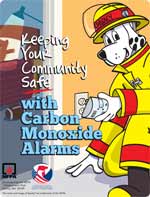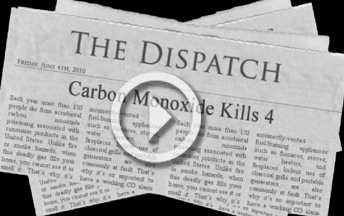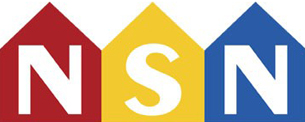
Want to learn more about CO? This toolkit from CPSC and the National Fire Protection Association (NFPA) offers consumers valuable safety tips for protecting their families from CO. There are resources for fire departments and public safety educators to help spread awareness in their communities about CO safety.
For families:
- Fast Facts about CO Alarms
- Get to Know Carbon Monoxide Alarms (English)
- Get to Know Carbon Monoxide Alarms (Spanish)
- Is Your Home Protected?
For Fire Departments and Public Safety Educators:
Tools for reaching out to the media and your community on CO safety
Social media
Sample news releases
- The importance of testing your CO alarms every month
- Remind residents about carbon monoxide alarm requirements and recommendations
- Hold an open house to increase residents’ awareness of CO alarm safety
Sample letter to the editor about CO safety
Sample Op/Ed on CO safety
CPSC Safety Guides:
|
|
|
|
|
Safety tips to use when using portable generators
Safety tips to use when using portable generators including a demographic chart |
A safety alert discussing carbon monoxide (CO) poisoning from camping equipment such as portable camping heaters, lanterns, stoves, campers and vehicles. Also, provides prevention advice and information on how to recognize the symptoms of CO poisoning.
|
|
|
A guide to first responders on dealing with CO exposure incidents. |
|
|
|
Four deadly hazards to avoid after a storm. |
Featured Resources

Carbon monoxide, also known as CO, is called the "Invisible Killer" because it's a colorless, odorless, poisonous gas. More than 150 people in the Unites States die every year from accidental non-fire related CO poisoning associated with consumer products, including generators. Other products include faulty, improperly-used or incorrectly-vented fuel-burning appliances such as furnaces, stoves, water heaters and fireplaces.

The Neighborhood Safety Network (NSN) is a special program of the U.S. Consumer Product Safety Commission designed to work with you to get timely safety information to members of your community who may otherwise be unaware of various dangers in and around their homes.
Unfortunately, we find that certain groups of Americans, such as the elderly, urban and rural low-income families, and some minority groups, are often underserved and do not hear about our safety messages. That’s where you come in.
By joining the NSN, you will receive free product safety messages and posters from CPSC that you can download and share in your community. Through the NSN, you have access to posters, checklists and toolkits that can be used to create a safety program in your neighborhood.
Become a partner in our campaign to share vital lifesaving safety information with your community.




 94x94.jpg)






